翻译第二章
- 格式:doc
- 大小:73.50 KB
- 文档页数:12
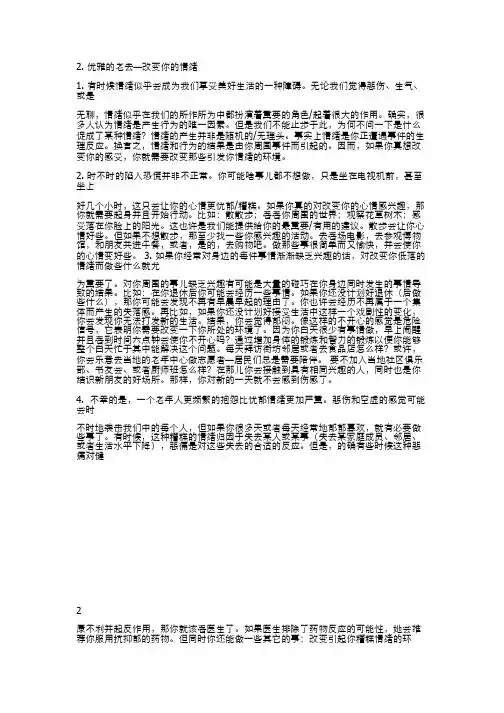
2. 优雅的⽼老去—改变你的情绪1. 有时候情绪似乎会成为我们享受美好⽣生活的⼀一种障碍。
⽆无论我们觉得悲伤、⽣生⽓气、或是!⽆无聊,情绪似乎在我们的所作所为中都扮演着重要的⾓角⾊色/起着很⼤大的作⽤用。
确实,很多⼈人认为情绪是产⽣生⾏行为的唯⼀一因素。
但是我们不能⽌止步于此,为何不问⼀一下是什么促成了某种情绪?情绪的产⽣生并⾮非是随机的/⽆无理头。
事实上情绪是你正遭遇事件的⽣生理反应。
换⾔言之,情绪和⾏行为的结果是由你周围事件⽽而引起的。
因⽽而,如果你真想改变你的感受,你就需要改变那些引发你情绪的环境。
2. 时不时的陷⼊入恐慌并⾮非不正常。
你可能啥事⼉儿都不想做,只是坐在电视机前,甚⾄至坐上!好⼏几个⼩小时,这只会让你的⼼心情更忧郁/糟糕。
如果你真的对改变你的⼼心情感兴趣,那你就需要起⾝身并且开始⾏行动。
⽐比如:散散步;看看你周围的世界;观察花草树⽊木;感受落在你脸上的阳光。
这也许是我们能提供给你的最重要/有⽤用的建议。
散步会让你⼼心情好些。
但如果不想散步,那⾄至少找⼀一些你感兴趣的活动。
去看场电影,去参观博物馆,和朋友共进午餐,或者,是的,去购物吧。
做那些事很简单⽽而⼜又愉快,并会使你的⼼心情变好些。
3. 如果你经常对⾝身边的每件事情渐渐缺乏兴趣的话,对改变你低落的情绪⽽而做些什么就尤!为重要了。
对你周围的事⼉儿缺乏兴趣有可能是⼤大量的碰巧在你⾝身边同时发⽣生的事情导致的结果。
⽐比如:在你退休后你可能会经历⼀一些事情。
如果你还没计划好退休(后做些什么),那你可能会发现不再有早晨早起的理由了。
你也许会经历不再属于⼀一个集体⽽而产⽣生的失落感。
再⽐比如,如果你还没计划好接受⽣生活中这样⼀一个戏剧性的变化,你会发现你⽆无法打发新的⽣生活。
结果,你会觉得郁闷。
像这样的不开⼼心的感觉是危险信号,它表明你需要改变⼀一下你所处的环境了。
因为你⽩白天很少有事情做,早上闹醒并且看到时间六点钟会使你不开⼼心吗?通过增加⾝身体的锻炼和智⼒力的锻炼以便你能够整个⽩白天忙于其中能解决这个问题。
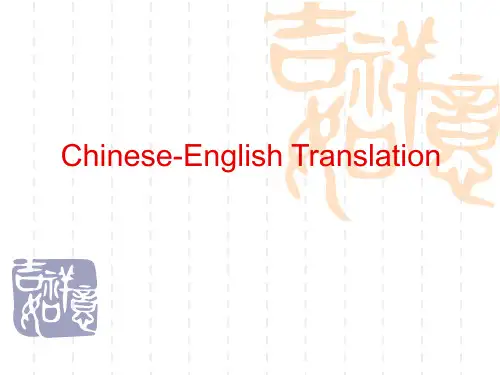

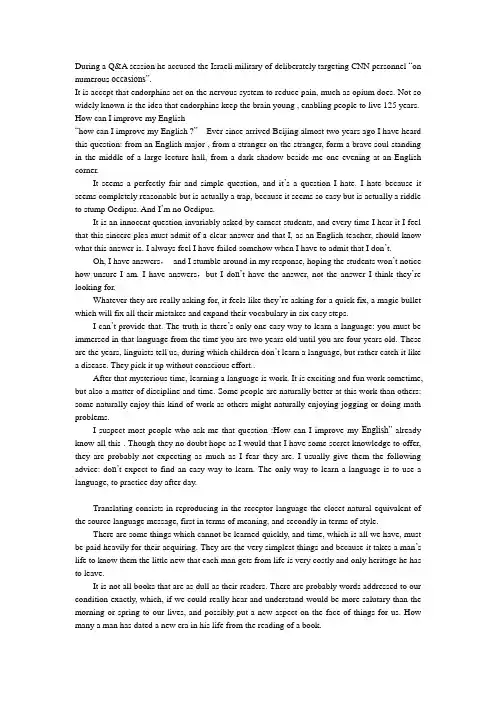
During a Q&A session he accused the Israeli military of deliberately targeting CNN personnel “on numerous occasions”.It is accept that endorphins act on the nervous system to reduce pain, much as opium does. Not so widely known is the idea that endorphins keep the brain young , enabling people to live 125 years. How can I improve my English“how can I improve my English ?”Ever since arrived Beijing almost two years ago I have heard this question: from an English major , from a stranger on the stranger, form a brave soul standing in the middle of a large lecture hall, from a dark shadow beside me one evening at an English corner.It seems a perfectly fair and simple question, and it’s a question I hate. I hate because it seems completely reasonable but is actually a trap, because it seems so easy but is actually a riddle to stump Oedipus. And I’m no Oedipus.It is an innocent question invariably asked by earnest students, and every time I hear it I feel that this sincere plea must admit of a clear answer and that I, as an English teacher, should know what this answer is. I always feel I have failed somehow when I have to admit that I don’t.Oh, I have answers,and I stumble around in my response, hoping the students won’t notice how unsure I am. I have answers,but I do n’t have the answer, not the answer I think they’re looking for.Whatever they are really asking for, it feels like they’re asking for a quick fix, a magic bullet which will fix all their mistakes and expand their vocabulary in six easy steps.I can’t provide that. The truth is there’s only one easy way to learn a language: you must be immersed in that language from the time you are two years old until you are four years old. These are the years, linguists tell us, during which children don’t learn a language, but rather catch it like a disease. They pick it up without conscious effort..After that mysterious time, learning a language is work. It is exciting and fun work sometime, but also a matter of discipline and time. Some people are naturally better at this work than others: some naturally enjoy this kind of work as others might naturally enjoying jogging or doing math problems.I suspect most people who ask me that question :How can I improve my English”-already know all this . Though they no doubt hope as I would that I have some secret knowledge to offer, they are probably not expecting as much as I fear they are. I usually give them the following advice: do n’t expect to find an easy way to learn. The only way to learn a language is to use a language, to practice day after day.Translating consists in reproducing in the receptor language the closet natural equivalent of the source language message, first in terms of meaning, and secondly in terms of style.There are some things which cannot be learned quickly, and time, which is all we have, must be paid heavily for their acquiring. They are the very simplest things and because it takes a man’s life to know them the little new that each man gets from life is very costly and only heritage he has to leave.It is not all books that are as dull as their readers. There are probably words addressed to our condition exactly, which, if we could really hear and understand would be more salutary than the morning or spring to our lives, and possibly put a new aspect on the face of things for us. How many a man has dated a new era in his life from the reading of a book.What is translation? Often , though not by any means always, it is rendering the meaning of a text. Common sense tells us that this ought be simple, as one ought to be able to say something as well in one language as in another. On the other hand, you may see it as complicated, artificial and fraudulent, since by using another language you are pretending to be someone you are not.Translation means the conversion of an expression from one language into another. To say it plainly, translation is an art to reproduce the exact idea of the author by means of a language different from the original. From the above definition of translation we know that the original thought of expression must be kept as far as possible. Nothing could be added to or taken away from the original work. The duty of the translation is simply to change the vocabulary, not the thought. In translation therefore, there are two essential elements: accuracy and expressiveness. Accuracy is the first indispensable quality of translation. The translator must cautiously stick to the author’s idea. Words selected and sentences constructed must be such as to convey the exact original thought. Expressiveness is to make the translation readily understood. In other words, the translator must express his author’s idea as clearly as forcibly as he can by the medium he employs. Accuracy is to make the thought definite and exact; while expressiveness is to make the translation vivid and attractive.。
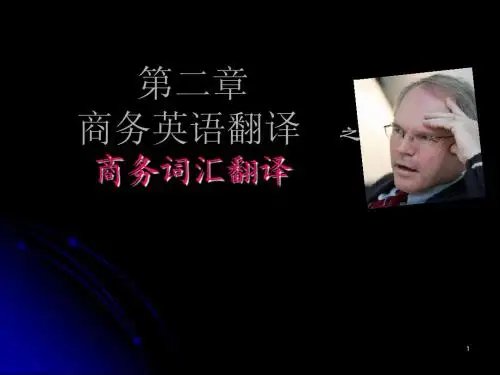
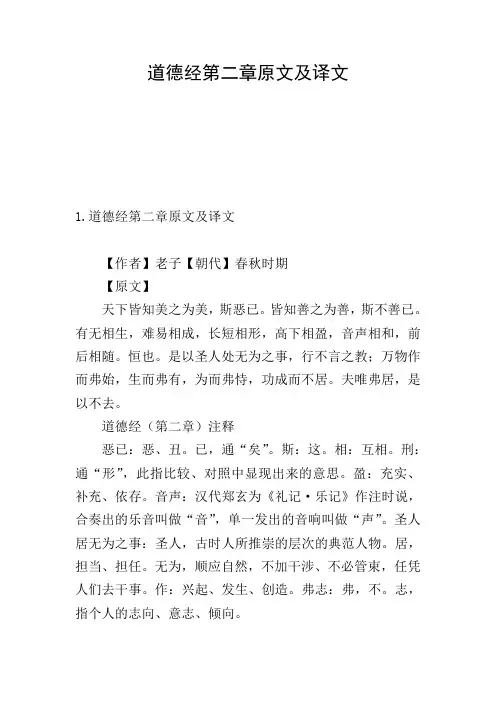
道德经第二章原文及译文1.道德经第二章原文及译文【作者】老子【朝代】春秋时期【原文】天下皆知美之为美,斯恶已。
皆知善之为善,斯不善已。
有无相生,难易相成,长短相形,高下相盈,音声相和,前后相随。
恒也。
是以圣人处无为之事,行不言之教;万物作而弗始,生而弗有,为而弗恃,功成而不居。
夫唯弗居,是以不去。
道德经(第二章)注释恶已:恶、丑。
已,通“矣”。
斯:这。
相:互相。
刑:通“形”,此指比较、对照中显现出来的意思。
盈:充实、补充、依存。
音声:汉代郑玄为《礼记·乐记》作注时说,合奏出的乐音叫做“音”,单一发出的音响叫做“声”。
圣人居无为之事:圣人,古时人所推崇的层次的典范人物。
居,担当、担任。
无为,顺应自然,不加干涉、不必管束,任凭人们去干事。
作:兴起、发生、创造。
弗志:弗,不。
志,指个人的志向、意志、倾向。
道德经(第二章)翻译天下人都知道美之所以为美,那是由于有丑陋的存在。
都知道善之所以为善,那是因为有恶的存在。
所以有和无互相转化,难和易互相形成,长和短互相显现,高和下互相充实,音与声互相谐和,前和后互相接随——这是永恒的。
因此圣人用无为的观点对待世事,用不言的方式施行教化:听任万物自然兴起而不为其创始,有所施为,但不加自己的倾向,功成业就而不自居。
正由于不居功,就无所谓失去。
道德经(第二章)赏析无论学术界在“道”的属性方面的争论多么激烈,学者们都一致认为老子的辩证法思想是其哲学上的显著特征。
老子认识到,宇宙间的事物都处在变化运动之中的,事物从产生到消亡,都是有始有终的、经常变的,宇宙间没有永恒不变的东西。
老子在本章里指出,事物都有自身的对立面,都是以对立的方面为自己存在的前提,没有“有”也就没有“无”,没有“长”也就没有“短”;反之亦然。
这就是中国古典哲学中所谓的“相反相成”。
本章所用“相生、相成、相形、相盈、相和、相随”等,是指相比较而存在,相依靠而生成,只是不同的对立概念使用的不同动词。

汉英翻译第二章选择词汇一、课后练习检查和讲评他说的一套,做的另一套。
教科书译文:He said one thing and did another.李老师认为教科书译文值得商榷。
Dear John,Please paraphrase (explain) the following sentenses:1.His words betray his actions.2.He dose not keep his words in line with his actions.3.When it comes to drive , she has got more than any one of us.thans!Li Tian-xinBoth 1. and 2. have the same meaning, however, the first (His words betray his actions.) is the more common way to express the concept.What this means is that what you say about a given subject iscontradictory to what you do. As an example ... a boy tells a girl thathe loves her, he can't live without her and various other romantic things. Then this same boy is seen with other girls in an intimate setting - maybe eating dinner, maybe going to a movie, and so on. He says that there is only one girl for him but his actionsprove him a liar - his words betray his actions.3. The word 'drive' here means desire, commitment and faithfulness to start and finish a project of any kind. Itcould be learning to swim, graduating from college (a 4-year commitment takes a lot of 'drive' to complete), even studying for an exam requires'drive' from the students who really want to succeed and achieve good things.A paraphrase of 3. then is: She has more faith, commitment and action in every aspect of her life than any of us.John干劲的英文音标:[ gànjìn ]drive; vigour; enthusiasm: 有头脑、干劲和首创精神的青年young men with brains, drive and initiative; 干劲十足be full of vigour; 冲天干劲boundless energy1.We shall want a real Henry Fordeffort .我们需要有一种真正亨利福特的干劲。
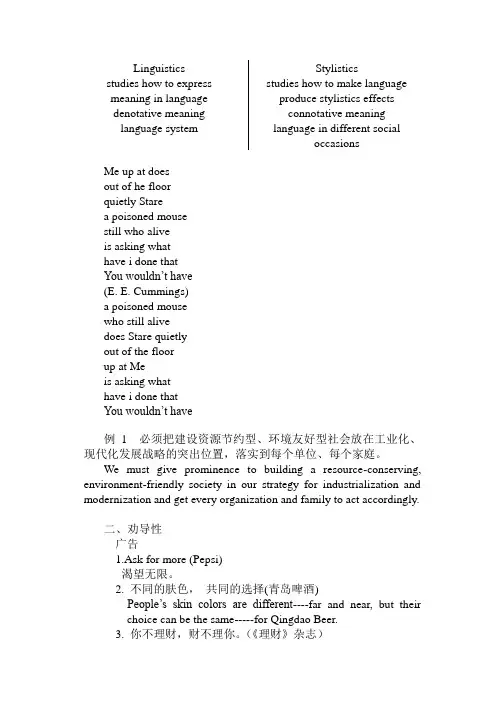
Linguistics studies how to express meaning in language denotative meaninglanguage systemStylisticsstudies how to make language produce stylistics effectsconnotative meaning language in different socialoccasionsMe up at doesout of he floorquietly Starea poisoned mousestill who aliveis asking whathave i done thatYou wouldn’t have(E. E. Cummings)a poisoned mousewho still alivedoes Stare quietlyout of the floorup at Meis asking whathave i done thatYou wouldn’t have例 1 必须把建设资源节约型、环境友好型社会放在工业化、现代化发展战略的突出位置,落实到每个单位、每个家庭。
We must give prominence to building a resource-conserving, environment-friendly society in our strategy for industrialization and modernization and get every organization and family to act accordingly.二、劝导性广告1.Ask for more (Pepsi)渴望无限。
2. 不同的肤色,共同的选择(青岛啤酒)People’s skin colors are different----far and near, but their choice can be the same-----for Qingdao Beer.3. 你不理财,财不理你。

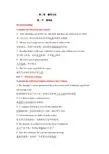
第二章翻译方法第一节增译法BrainstormingTranslate the following into Chinese1.After climbing a great hill, one only finds that there are many more to climb. 登上高山后,你会发现还有更多的山峰等着你去超越。
2.Money won’t create success, the freedom to make it will.创造成功,靠的不是金钱,而是拥有创造成功的自由。
3.Reading makes a full man; conference a ready man; writing an exact man.读书使人充实;讨论使人机智,写作使人缜密。
4.We won’t attack unless attacked.人不犯我,我不犯人。
5.She was more royal than the royals.她比皇家成员更有皇家气质。
Part V Practical trainingTranslate the following English sentences into Chinese1. The manager’s report summarized the achievement made in industry, agriculture and foreign trade.经理的报告总结了在工业、农业以及外贸三个方面取得的成就。
2. I’ve been to John’s company twice.我曾经去过约翰的公司两次。
3. A computer will help us a lot for the analysis job.如果我们用一台电脑来做这个分析,则会事半功倍。
4. Unless informed, we shall not make copies.除非贵方通知我们,否则我们不会制作副本。
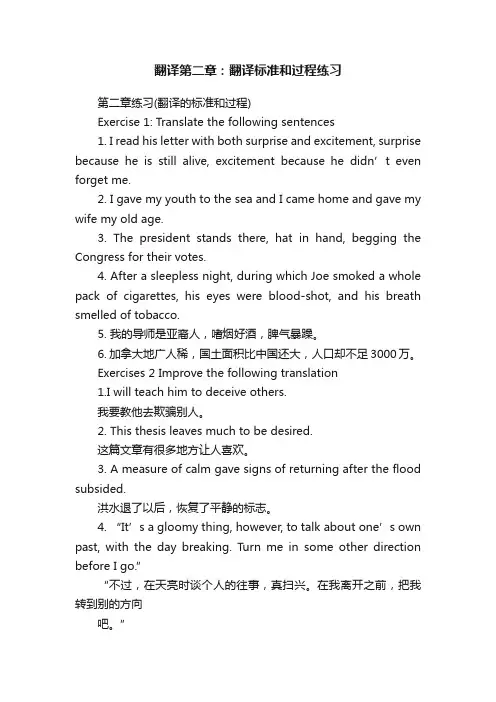
翻译第二章:翻译标准和过程练习第二章练习(翻译的标准和过程)Exercise 1: Translate the following sentences1. I read his letter with both surprise and excitement, surprise because he is still alive, excitement because he didn’t even forget me.2. I gave my youth to the sea and I came home and gave my wife my old age.3. The president stands there, hat in hand, begging the Congress for their votes.4. After a sleepless night, during which Joe smoked a whole pack of cigarettes, his eyes were blood-shot, and his breath smelled of tobacco.5. 我的导师是亚裔人,嗜烟好酒,脾气暴躁。
6. 加拿大地广人稀,国土面积比中国还大,人口却不足3000万。
Exercises 2 Improve the following translation1.I will teach him to deceive others.我要教他去欺骗别人。
2. This thesis leaves much to be desired.这篇文章有很多地方让人喜欢。
3. A measure of calm gave signs of returning after the flood subsided.洪水退了以后,恢复了平静的标志。
4. “It’s a gloomy thing, however, to talk about one’s own past, with the day breaking. Turn me in some other direction before I go.”“不过,在天亮时谈个人的往事,真扫兴。
高中伦语十二章译文摘要:一、介绍论语和伦语的概念二、翻译第一章:学而时习之,不亦说乎?三、翻译第二章:有朋自远方来,不亦乐乎?四、翻译第三章:人不知而不愠,不亦君子乎?五、翻译第四章:曾子曰:吾日三省吾身六、翻译第五章:子曰:吾十有五而志于学七、翻译第六章:子曰:三十而立八、翻译第七章:子曰:四十而不惑九、翻译第八章:子曰:五十而知天命十、翻译第九章:子曰:六十而耳顺十一、翻译第十章:子曰:七十而从心所欲,不逾矩十二、总结与反思正文:【提纲一】介绍论语和伦语的概念《论语》是一部儒家经典著作,是记录孔子及其弟子言行的书,而伦语则是《论语》中的一个章节。
它主要阐述了人生哲理、道德品质、为人处世等方面的智慧,对于我们的生活有着重要的指导意义。
【提纲二】翻译第一章:学而时习之,不亦说乎?这一章的翻译是:学习之后要时常温习,不是很快乐吗?这里强调了学习的重要性,同时也告诉我们学习要持之以恒,只有不断温习才能真正掌握所学的知识。
【提纲三】翻译第二章:有朋自远方来,不亦乐乎?这一章的翻译是:有志同道合的朋友从远方来,不是很快乐吗?这里强调了友谊的可贵,也表达了孔子的热情好客之道。
【提纲四】翻译第三章:人不知而不愠,不亦君子乎?这一章的翻译是:别人不了解自己而不生气,不正是君子的表现吗?这里强调了为人处世的修养,告诉我们不要因为别人的误解而生气。
【提纲五】翻译第四章:曾子曰:吾日三省吾身这一章的翻译是:曾子说:我每天都要反省自己三次。
这里强调了自我反省的重要性,只有不断反省才能不断提高自己。
【提纲六】翻译第五章:子曰:吾十有五而志于学这一章的翻译是:孔子说:我十五岁就立志学习。
这里强调了立志学习的重要性,同时也启示我们要及早立志,为人生奋斗。
【提纲七】翻译第六章:子曰:三十而立这一章的翻译是:孔子说:三十岁要有所成就。
这里强调了人生的阶段性目标,告诉我们到了三十岁就应该有所成就,有所作为。
【提纲八】翻译第七章:子曰:四十而不惑这一章的翻译是:孔子说:四十岁要不再迷茫。
Task 11. delicate skin 娇嫩的皮肤2. delicate porcelain 精致的瓷器3. delicate living 奢侈的生活4. delicate health 虚弱的身体5. delicate stomach 容易吃坏的胃6. delicate vase 易碎的花瓶7. delicate diplomatic question 微妙的外交关系8. delicate difference 细微的差别9. delicate surgical operation 复杂的/难做的外科手术10. delicate sense of smell 灵敏的嗅觉11. delicate touch 生花妙笔12. delicate food 美味的食物Task 21. 申请书letter of application2. 报告书report3. 协议书agreement4. 说明书directions/instruction5. 旅行委托书booking form6. 成交确认书sales confirmation7. 电视机使用说明书TV operation guide8. 白皮书white book/statement, document9. 家书letter (from) home10. 文凭/毕业证书diploma/degree certificateTask 31.他只要听到几句恭维话就会得意忘形。
A little flattery would set him carried away.2.答英语卷越认真越好。
You can never be too careful in answering an English paper.3.公费吃喝是群众反映强烈的不良之风之一。
Sumptuous banquets, financed by state money, have long been a bane on Chinese society.4.要筹集2万5千英磅她完全无力办得到。
哈利波特第二章翻译Harry Potter and the Chamber of SecretsChapter 2: Dobby's WarningHarry's summer holidays with the Dursleys had been anything but pleasant. He had been locked in his room for most of the time, as his aunt and uncle were angry with him for the events that had taken place at the end of the last school year. Harry's only source of escape had been his correspondence with his best friends Ron Weasley and Hermione Granger, who had sent him letters about their summer adventures.As Harry eagerly anticipated the start of his second year at Hogwarts School of Witchcraft and Wizardry, strange things began happening. Harry noticed weird creatures following him around, and mysterious letters warning him not to return to Hogwarts.One night, Harry's bedroom is suddenly invaded by an eccentric house-elf named Dobby. Dobby warns Harry that if he goes back to Hogwarts, he will be in great danger. The house-elf desperately tries to convince Harry not to return to school by any means necessary, including causing various accidents and mishaps.Despite Dobby's warnings, Harry is determined to return to Hogwarts and his friends. He refuses to be frightened away. As a result, Dobby becomes increasingly frustrated and upset.The next day, Harry and his friends Ron and Hermione receive a surprise visit from Ron's older brothers, Fred and George Weasley.The Weasley twins are there to take Harry to Diagon Alley, the wizarding shopping district, to buy his school supplies. Harry is thrilled by the unexpected visit, grateful for a break from the Dursleys' constant mistreatment.As Harry and the Weasley twins make their way through Diagon Alley, they pass a crowd gathered around a store called Flourish and Blotts. Curious, Harry stops to see what is happening and discovers that the famous author Gilderoy Lockhart is there, signing autographs for his new book. Harry and the Weasley twins decide to go in and see what the fuss is about.In the packed bookstore, Harry catches Lockhart's attention accidentally, and to everyone's surprise, Lockhart takes Harry aside and starts boasting about his celebrity status. Harry is unimpressed with Lockhart's arrogance but tries to keep up a polite conversation. Meanwhile, Ron and Hermione browse through the bookstore, picking out their school books and supplies.As they leave Flourish and Blotts, Harry notices a familiar face in the crowd: Lucius Malfoy, Draco Malfoy's father and a known supporter of the Dark Arts. Harry feels a sense of unease at the sight of the Malfoys, but he cannot fathom why Lucius would be in Diagon Alley.Back at the Burrow, the Weasley family's home, Harry is welcomed heartily by Ron's parents and brothers. It feels like a second home to Harry, where he is treated with kindness and acceptance. The annual Back-to-School feast with the Weasleys is filled with laughter and delicious food, a stark contrast to theDursleys' cold and restrictive environment.As Harry reflects on his eventful day, he can't help but wonder about Dobby's warning and the presence of Lucius Malfoy. He knows that this school year might hold some unexpected challenges, but he is determined to face them head-on.。
第二章一般考虑Ⅰ.阈值可采性问题简短的总结一个证据可能会在一个句子中:它的材料和值得注意的问题—----相关证据的采信。
⒈重要性:命题的证明materjality存在。
当提供的证据涉及到的一个实质性的法律问题在案件。
关键问题要问实质性问题是:提供证明的证据是什么?是法律问题,材料的实质性行动的原因或防御?这些问题的答案,确定实质性依赖于法律问题的框架的诉状。
因此,证据是非物质性的,它提供的证据并不是一个法律案件的问题。
⒉意义:probativeness-the之间的联系和命题的证明试验证明性包含实质性和更多的东西。
鉴定证据有助于证明或驳斥材料问题。
⒊联邦rules-materiality在联邦证据规则,有大多数现代守则,要求的重要性并证明性合并为一个单一的相关定义。
因此,联邦规则关于提供相关证据”是指证据倾向于证明(证明性)任何事实后果的行动(重要性)。
⒋能力,胜任,称职/权限/作证能力如上所述,如果没有违法证据排除法则,那么证据材料相关,只有一个原因,这些证据将不承认它是禁止的证据排除规则。
Ⅱ.证据分类1。
直接环境(1)直接证据是直接材料不干预的一个推理过程。
他们认为证据是直接了当很争议的事实,是传达者实际运用知识的手段。
(2)间接证据依赖于推理。
间接的证据是间接的和依赖于推理。
这是证据的一个附属或附带的事实,单独或欺诈总结的其他情况,存在的问题实质可以推断。
2。
证明,文件,或(1)言词证据口头证据下的誓言。
证人的响应问题的attomeys。
(2)书面证据是证据的形式书写,如合同或自白。
(3)真正的证据是指应用证据组成的事物的区别从断言证人的事。
真正的证据包括输送第一手感觉印象的事实的审判者,如刀,珠宝,地图,或磁带录音。
Ⅲ.有限可采。
1。
容许一个目的而不是另一个使用的证据是一个经常遇到的问题。
经常发生的是证据是容许的目的之一,但不容许的另一个目的。
2。
容许对一个而不是另一方这也是可能的,证据是容许对一方但不容许对对方。
第二章翻译的过程翻译的过程可以分为三个步骤: (1) 阅读并分析原文(analysis of the source text), (2) 将原文转换成译入语(transfer from source to target language)(3) 对译文进行修订(revision) 2.1 阅读并分析原文把握原文的意图:原文的意图指原作者对有关题材或内容的立场或态度。
作者可能会慷慨激昂,淋漓尽致地倾诉自己的立场观点,也可能采取比较隐晦的手段,在字里行间透出某种微妙的信息。
一、语法结构阐释原文的意图。
例如:a. Police Shoot Rioting Blacksb. Rioting Blacks Shot by Policec. Rioting Blacks Shot形式对意义的表达在诗歌中的作用。
例如:40-LOVERoger McGoughMiddle agedcouple playingten- niswhen thegame endsand theygo homethe netwill stillbe be-tween them许渊冲的译文:四十岁的爱情中年夫妇打网球打完后回家走球网依旧把人分左右二、语义分析(semantic analysis ): 即说明处在一定语境中,按照一定次序排列的词项或句项之间的语义关系,探索词项、句项的意义。
“我们所翻译的不是某些言词,而是看不见、听不到的东西,即意义本身。
”(William Hans of The Theory of Translation )首先,分析词的概念意义(conceptual meaning )和关联意义(associative meaning )例如:seat oneself in a wooden chair accept a university chairchair the board meeting condemned to the chair其次,把握意义关系,注意同反义、褒贬义、多义与歧义等关系。
例如:George made great progress at school.Let us be great friendsHe has the reputation of being a blood-sucker.She has made a reputation for herself through hard work.Good fortune lieth within bad, bad fortune lurketh within good.第三,了解文化特征、历史演变、社会发展、科技进步对语言的影响。
例如:“Greek and Latin are all English to me.” said Oscar Wilde. (It is Greek to me.) There are cattle in the fields, but we sit down to beef.小犬将于下月结婚。
第四,了解语言的随意性和约定俗成性。
例如:1) milk the cow 2) milk the bull3) sleeping beauty 4) sleeping spy5) You said that it is out of question, but it seems to me that it is out of the question. 第五,注意词语的搭配关系、逻辑关系和山下文关系。
例如:1) He wrote his 12 th novel at the ripe age of 85.2) 1990 was a bad year for the Soviet economy. It ended with a balance of trade.3) A “Well, old boy,” said the visitor, “it's nice to see you up and about.”B “Up, yes,” the patient said, “but about, no, at least not much”.三、语境分析(analysis of the context)语境包含:语言内部的上下文关系;话语与经验世界的关系。
(一)上下文分析(contextual analysis/ linguistic context ):首先,一个词与周围词的关系。
例如:Today a politician without elbows is as lost as a politician without principles.其次,短语是否是语义整体。
例如:--I don't know what you do with your brass.--I spend it on you, always a good table, you must have. Never anything short.再次,一个句子是否是一个独立的语义单位。
例如:The face is the index of the mind.Far from eye, far from heart.Mr. Lear is trying to oil the judge's palm.He has stolen a march on me.Today in the New York Stock Exchange, all the brothers are tails up.(二)语言与经验世界的关系(non-linguistic context )所谓非语言环境,指话语及其组成部分与文化和自然环境的相互关系。
例如:Did he receive a warm welcome from the first lady of the house?首先,话语发生时环境。
例如:It's freezing cold here.其次,身体语言(body language )。
例如:“You think we can”—he glanced at the couple ahead of them--“like them—you and I?” She shook her head.四、语用分析(pragmatic analysis )语用分析即通过对语言的交际意义的综合分析,了解和确定说话人和话语间的关系,常常表现为说话人的感情、态度、情绪、意念等。
(一)讲话者的情感参与(1 )请求:Would you mind lending me 10 yuan?(2 )许诺:I shall return the book tomorrow.(3 )警告:Say that again and I'll part with you once and for all.(4 )褒贬:You are stubborn. He is pig-headed. I am strong-willed.(二)准确表达说话人的意图1 ,确认but, even, and, before 等词的语用意义。
例如:Harry is a professor, but can't spell.Even Max fell into love with her.And you talked to him this way after all he'd done for you.It will be a couple of years before we meet again.2, 确认潜台词。
例如:“A down-to-earth man would have succeeded.” father scolded me.2.2 将原文转换成译入语如何忠实地表达原文的意思,按照英国翻译理论家纽马克(Newmark) 的观点,在表达的过程中,译者必须在四个层次上对原文和译文负责,即:文本层次(textual level );所指层次(referential level );粘着层次(cohesive level )和自然层次(level of naturalness )一、文本层次(textual level )文本层次指原文的字面意义。
译者对原文负责,就是对原文的字面意义负责。
例如:1 )You flatter me.原译:你拍我马屁。
改译:你过奖了。
2 )He is lying on his back.3) 在斯坦福大学的迎新晚会上,玛丽问他“你是个中国留学生吗?”译文:In the evening party to welcome new arrivals in Stanford University, Mary asked him, “…”4) 画上是几个中国美女。
原译:There are some Chinese beautiful girls on the picture.改译:There are some beautiful Chinese girls in the picture.二、所指层次(referential level)指译者对原文所指意义的把握。
原文中晦涩、隐含的弦外之音,需要译者透过文字的迷雾看清楚真实的内涵。
例如:1 )A: You alone here?B: I'm saving myself for you.原译:A: 你一个人?B: 我在为你救我自己。
2 )The old man stood from the chair.3) [唐长安城] 划分为108坊和东市、西市两个商业区。
原译:It was divided into one hundred and eight workshops and two commercial districts —the East City and the West City.4) 1911年,在一个小县城里边,我生在一个小地主家里。
原译: In the year of 1911, I was born in the home of a petty landlord in a small country town.5)他(听到这话)心里一跳,脸色也变了.原译:His heart jumped and the color of his face changed.6) 三四个筛酒的酒保,都手忙脚乱,搬东搬西。
(施耐庵《水浒传》)原译:But these serving men were so busy, their hands and feet were all in confusion, and they were moving things hither and thither, east and west. (All Men Are Brothers)三、粘着层次(cohesive level)粘着层次指语篇中句子的衔接。